中考英语真题阅读 Topic 10 Travel and Transport 旅游与交通
- 格式:doc
- 大小:127.00 KB
- 文档页数:13
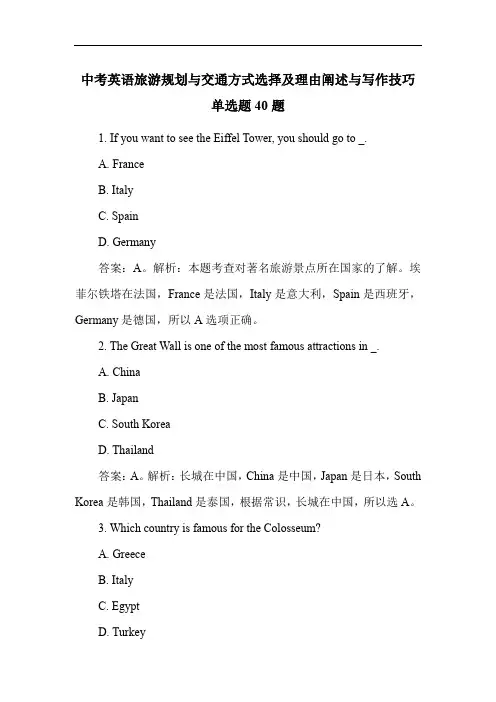
中考英语旅游规划与交通方式选择及理由阐述与写作技巧单选题40题1. If you want to see the Eiffel Tower, you should go to _.A. FranceB. ItalyC. SpainD. Germany答案:A。
解析:本题考查对著名旅游景点所在国家的了解。
埃菲尔铁塔在法国,France是法国,Italy是意大利,Spain是西班牙,Germany是德国,所以A选项正确。
2. The Great Wall is one of the most famous attractions in _.A. ChinaB. JapanC. South KoreaD. Thailand答案:A。
解析:长城在中国,China是中国,Japan是日本,South Korea是韩国,Thailand是泰国,根据常识,长城在中国,所以选A。
3. Which country is famous for the Colosseum?A. GreeceB. ItalyC. EgyptD. Turkey答案:B。
解析:斗兽场在意大利。
Greece是希腊,Egypt是埃及,Turkey是土耳其,而意大利以斗兽场而闻名,所以B选项正确。
4. You can visit the Pyramids if you go to _.A. EgyptB. MoroccoC. AlgeriaD. Libya答案:A。
解析:金字塔在埃及。
Morocco是摩洛哥,Algeria是阿尔及利亚,Libya是利比亚,金字塔是埃及的标志性景点,所以答案为A。
5. Big Ben is located in _.A. the United KingdomB. the United StatesC. CanadaD. Australia答案:A。
解析:大本钟位于英国。
the United States是美国,Canada 是加拿大,Australia是澳大利亚,大本钟是英国的著名景点,所以选A。
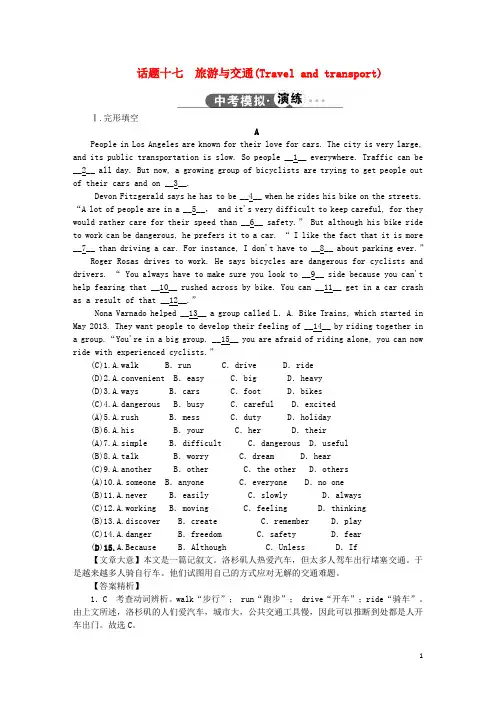
话题十七旅游与交通(Travel and transport)Ⅰ.完形填空APeople in Los Angeles are known for their love for cars. The city is very large, and its public transportation is slow. So people __1__ everywhere. Traffic can be __2__ all day. But now, a growing group of bicyclists are trying to get people out of their cars and on __3__.Devon Fitzgerald says he has to be __4__ when he rides his bike on the streets. “A lot of people are in a __5__, and it's very difficult to keep careful, for they would rather care for their speed than __6__ safety.” But although his bike ride to work can be dangerous, he pr efers it to a car. “ I like the fact that it is more __7__ than driving a car. For instance, I don't have to __8__ about parking ever.”Roger Rosas drives to work. He says bicycles are dangerous for cyclists and drivers. “ You always have to make sure you look to __9__ side because you can't help fearing that __10__ rushed across by bike. You can __11__ get in a car crash as a result of that __12__.”Nona Varnado helped __13__ a group called L.A. Bike Trains, which started in May 2013. They want people to develop their feeling of __14__ by riding together in a group.“You're in a big group. __15__ you are afraid of riding alone, you can now ride with experience d cyclists.”(C)1.A.walk B.run C.drive D.ride(D)2.A.convenient B.easy C.big D.heavy(D)3.A.ways B.cars C.foot D.bikes(C)4.A.dangerous B.busy C.careful D.excited(A)5.A.rush B.mess C.duty D.holiday(B)6.A.his B.your C.her D.their(A)7.A.simple B.difficult C.dangerous D.useful(B)8.A.talk B.worry C.dream D.hear(C)9.A.another B.other C.the other D.others(A)10.A.someone B.anyone C.everyone D.no one(B)11.A.never B.easily C.slowly D.always(C)12.A.working B.moving C.feeling D.thinking(B)13.A.discover B.create C.remember D.play(C)14.A.danger B.freedom C.safety D.fear(D)15.A.Because B.Although C.Unless D.If【文章大意】本文是一篇记叙文。
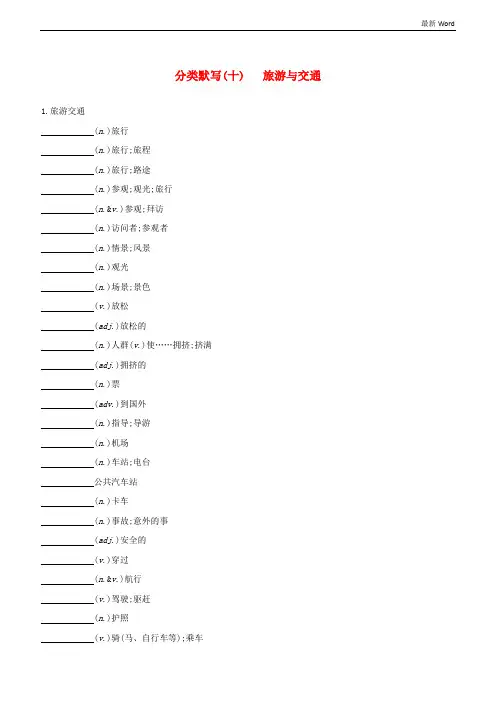
分类默写(十) 旅游与交通1.旅游交通(n.)旅行(n.)旅行;旅程(n.)旅行;路途(n.)参观;观光;旅行(n.&v.)参观;拜访(n.)访问者;参观者(n.)情景;风景(n.)观光(n.)场景;景色(v.)放松(adj.)放松的(n.)人群(v.)使……拥挤;挤满(adj.)拥挤的(n.)票(adv.)到国外(n.)指导;导游(n.)机场(n.)车站;电台公共汽车站(n.)卡车(n.)事故;意外的事(adj.)安全的(v.)穿过(n.&v.)航行(v.)驾驶;驱赶(n.)护照(v.)骑(马、自行车等);乘车(v.)飞行;(旗子等)飘动;空运(vt.)用船装运(n.)轮船(v.)登岸;降落(n.)飞机(n.)公共汽车(n.)自行车(n.)火车(n.)小汽车(n.)小船(n.)出租车(n.)地铁(n.)交通(n.&v.)运输;运送(n.)飞行;航班(n.)马车;长途车;教练(n.)轮子(n.)路线;路(n.)铁路2.方位(n.)方向(n.)中心(n.)边;面;侧(n.)前面;前线(n.&adj.)中间(的)(n.)底部(n.)顶部(n.)表面(n.&adj.)东方;东方的(n.&adj.)西方;西方的(n.&adj.)南方;南方的(n.&adj.)北方;北方的(prep.)在(几点钟);在(某处)(prep.)在……之上;在……上面(prep.)多于;在……上方;遍及(prep.)在……下面(prep.)在……下面(prep.)在……之中(prep.)在……之间(prep.)里面;在(或向)里面(prep.)环绕;四周(prep.)在……旁边(prep.)在……后面(adv.)向上,起来(adv.)向下(adv.)向后(adj.)东部的(adj.)西部的(adj.)南方的(adj.)北方的;北部的(adj.)中心的(adj.&v.)近的;亲近的;关闭(adj.)近的;接近(adj.)隔壁的;紧接着的;下一步(adj.)远的(adj.)直的;笔直的(adj.)低的(adj.)左边的(n.)左边(adj.)正确的;右边的(n.)右边【参考答案】1.旅游交通travel (n.)旅行trip (n.)旅行;旅程journey (n.)旅行;路途tour (n.)参观;观光;旅行visit (n.&v.)参观;拜访visitor (n.)访问者;参观者sight (n.)情景;风景sightseeing (n.)观光scene (n.)场景;景色relax (v.)放松relaxed (adj.)放松的crowd (n.)人群(v.)使……拥挤;挤满crowded (adj.)拥挤的ticket (n.)票abroad (adv.)到国外guide (n.)指导;导游airport (n.)机场station (n.)车站;电台bus stop 公共汽车站truck (n.)卡车accident (n.)事故;意外的事safe (adj.)安全的cross (v.)穿过sail (n.&v.)航行drive (v.)驾驶;驱赶passport (n.)护照ride (v.)骑(马、自行车等);乘车fly (v.)飞行;(旗子等)飘动;空运ship (vt.)用船装运(n.)轮船land (v.)登岸;降落airplane (n.)飞机bus (n.)公共汽车bike=bicycle (n.)自行车train (n.)火车car (n.)小汽车boat (n.)小船taxi (n.)出租车underground (英)=subway(美) (n.)地铁traffic (n.)交通transport (n.&v.)运输;运送flight (n.)飞行;航班coach (n.)马车;长途车;教练wheel (n.)轮子way (n.)路线;路railway (n.)铁路2.方位direction (n.)方向centre (美 center) (n.)中心side (n.)边;面;侧front (n.)前面;前线middle (n.&adj.)中间(的)bottom (n.)底部top (n.)顶部surface (n.)表面east (n.&adj.)东方;东方的west (n.&adj.)西方;西方的south (n.&adj.)南方;南方的north (n.&adj.)北方;北方的at (prep.)在(几点钟);在(某处)upon (prep.)在……之上;在……上面over (prep.)多于;在……上方;遍及below (prep.)在……下面under (prep.)在……下面among (prep.)在……之中between (prep.)在……之间inside (prep.)里面;在(或向)里面around (prep.)环绕;四周beside (prep.)在……旁边behind (prep.)在……后面up (adv.)向上,起来down (adv.)向下back (adv.)向后eastern (adj.)东部的western (adj.)西部的southern (adj.)南方的northern (adj.)北方的;北部的central (adj.)中心的close (adj.&v.)近的;亲近的;关闭near (adj.)近的;接近next (adj.)隔壁的;紧接着的;下一步far (adj.)远的straight (adj.)直的;笔直的low (adj.)低的left (adj.)左边的(n.)左边right (adj.)正确的;右边的(n.)右边。
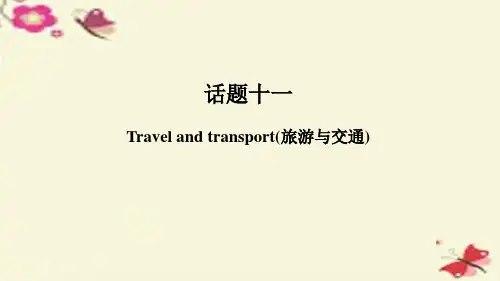
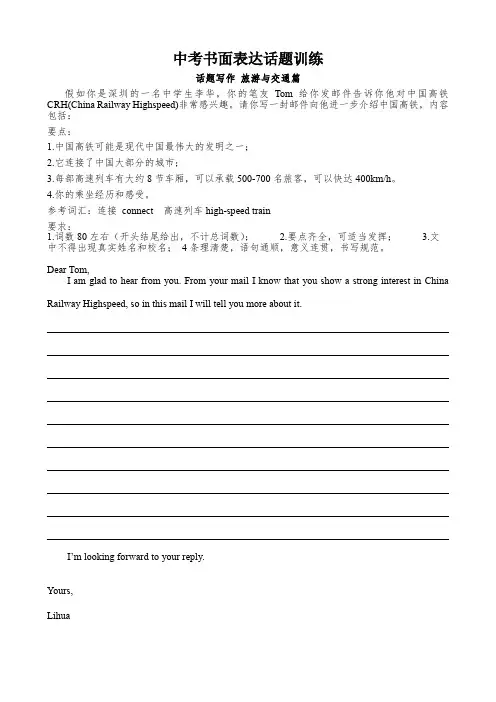
中考书面表达话题训练话题写作旅游与交通篇假如你是深圳的一名中学生李华,你的笔友Tom给你发邮件告诉你他对中国高铁CRH(China Railway Highspeed)非常感兴趣。
请你写一封邮件向他进一步介绍中国高铁,内容包括:要点:1.中国高铁可能是现代中国最伟大的发明之一;2.它连接了中国大部分的城市;3.每部高速列车有大约8节车厢,可以承载500-700名旅客,可以快达400km/h。
4.你的乘坐经历和感受。
参考词汇:连接connect 高速列车high-speed train要求:1.词数80左右(开头结尾给出,不计总词数);2.要点齐全,可适当发挥;3.文中不得出现真实姓名和校名;4条理清楚,语句通顺,意义连贯,书写规范。
Dear Tom,I am glad to hear from you. From your mail I know that you show a strong interest in China Railway Highspeed, so in this mail I will tell you more about it.I’m looking forward to your reply.Yours,Lihua课标对应话题:17. 旅游与交通(Travel and transport)短语积累:1.最伟大的发明之一2.承载500-700名旅客3.快达400km/h4.舒适与方便的5.进行火车旅行基础写作:1.中国高铁可能是现代中国最伟大的发明之一。
2.它连接了中国大部分的城市。
3.每部高速列车有大约8节车厢,可以承载500-700名旅客。
4.每年暑假,我乘高铁拜访我的祖父母。
5.例如, 我们可以在列车上购买食物和饮料。
技巧点拨:1. perhaps one of the +(-est) 引导最高级表述,其中副词perhaps/probably不可缺少。
例句:Her dishes is probably one of the most delicious dishes in the world.It is perhaps one of the most popular temples in Asia.仿写:中国高铁可能是现代中国最伟大的发明之一。
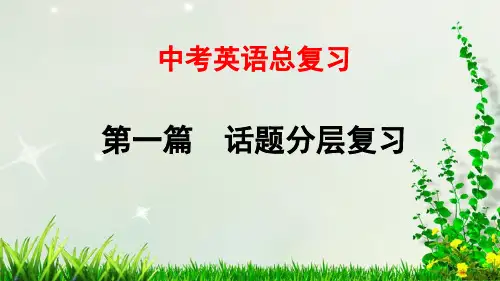
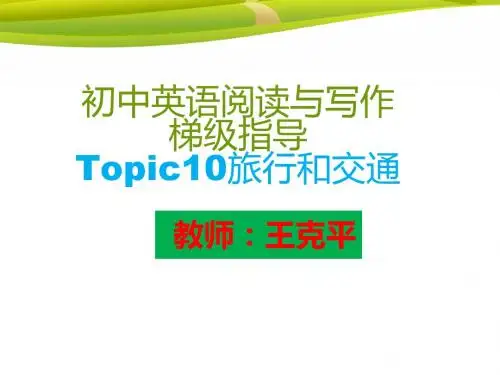

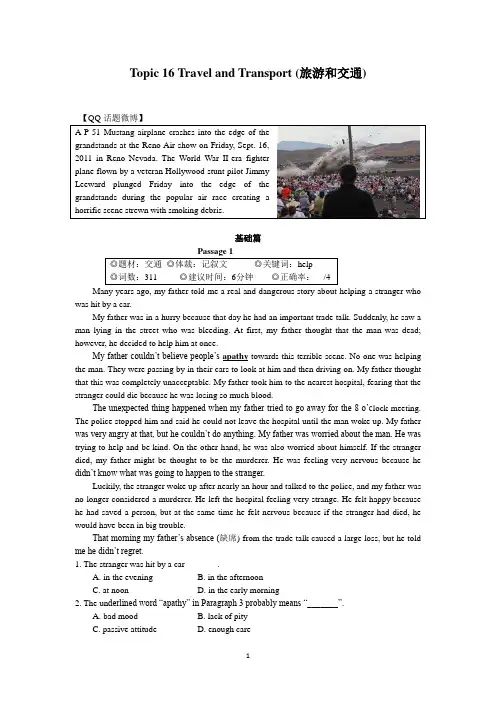
Topic 16 Travel and Transport (旅游和交通)基础篇was hit by a car.My father was in a hurry because that day he had an important trade talk. Suddenly, he saw a man lying in the street who was bleeding. At first, my father thought that the man was dead; however, he decided to help him at once.My father couldn’t believe people’s apathy towards this terrible scene. No one was helping the man. They were passing by in their cars to look at him and then driving on. My father thought that this was completely unacceptable. My father took him to the nearest hospital, fearing that the stranger could die because he was losing so much blood.The unexpected thing happened when my father tried to go away for the 8 o’c lock meeting. The police stopped him and said he could not leave the hospital until the man woke up. My father was very angry at that, but he couldn’t do anything. My father was worried about the man. He was trying to help and be kind. On the other hand, he was also worried about himself. If the stranger died, my father might be thought to be the murderer. He was feeling very nervous because he didn’t know what was going to happen to the stranger.Luckily, the stranger woke up after nearly an hour and talked to the police, and my father was no longer considered a murderer. He left the hospital feeling very strange. He felt happy because he had saved a person, but at the same time he felt nervous because if the stranger had died, he would have been in big trouble.That morning my father’s absence (缺席) from the trade talk caused a large loss, but he told me he didn’t regret.1. The stranger was hit by a car _______.A. in the eveningB. in the afternoonC. at noonD. in the early morning2. The un derlined word ―apathy‖ in Paragraph 3 probably means ―_______‖.A. bad moodB. lack of pityC. passive attitudeD. enough care3. The police stopped the writer’s father leaving probably because they _______.A. thought that the writer’s father might have caused the accidentB. thought that the stranger would thank the writer’s father after waking upC. wanted the writer’s father to take care of the strangerD. thought that the writer’s father was a friend of the stranger’s4. If the same thing happene d later, the writer’s father would _______.A. avoid getting himself into troubleB. still offer to help just as he didC. have no interest in itD. report it to the police and then go away【篇章导读】我父亲因帮助在交通事故中受伤的人没能按时参加商业会谈,导致公司遭受了损失,但是他不后悔。
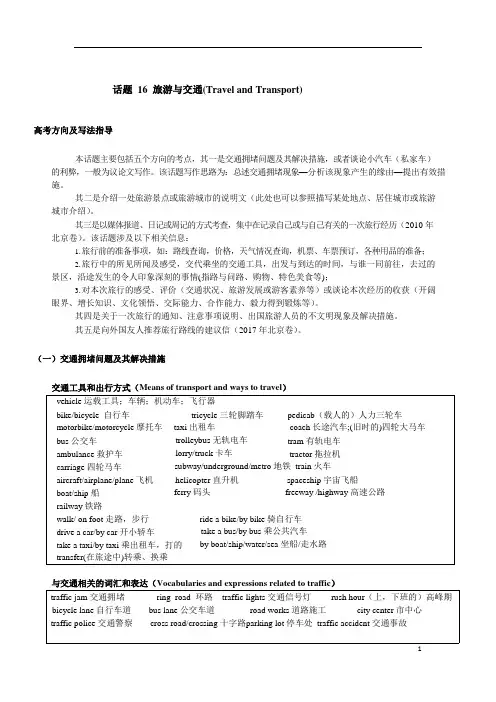
话题 16 旅游与交通(Travel and Transport)高考方向及写法指导本话题主要包括五个方向的考点,其一是交通拥堵问题及其解决措施,或者谈论小汽车(私家车) 的利弊,一般为议论文写作。
该话题写作思路为:总述交通拥堵现象—分析该现象产生的缘由—提出有效措施。
其二是介绍一处旅游景点或旅游城市的说明文(此处也可以参照描写某处地点、居住城市或旅游城市介绍)。
其三是以媒体报道、日记或周记的方式考查,集中在记录自己或与自己有关的一次旅行经历(2010 年北京卷)。
该话题涉及以下相关信息:1. 旅行前的准备事项,如:路线查询,价格,天气情况查询,机票、车票预订,各种用品的准备;2. 旅行中的所见所闻及感受,交代乘坐的交通工具,出发与到达的时间,与谁一同前往,去过的景区,沿途发生的令人印象深刻的事情(指路与问路、购物、特色美食等);3. 对本次旅行的感受、评价(交通状况、旅游发展或游客素养等)或谈论本次经历的收获(开阔眼界、增长知识、文化领悟、交际能力、合作能力、毅力得到锻炼等)。
其四是关于一次旅行的通知、注意事项说明、出国旅游人员的不文明现象及解决措施。
其五是向外国友人推荐旅行路线的建议信(2017 年北京卷)。
(一)交通拥堵问题及其解决措施交通工具和出行方式(Means of transport and ways to travel )与交通相关的词汇和表达(Vocabularies and expressions related to traffic ) cross road/crossing 十字路parking lot 停车处 traffic accident 交通事故rush hour (上,下班的)高峰期city center 市中心 road works 道路施工bus lane 公交车道 ring road 环路 traffic lights 交通信号灯 traffic jam 交通拥堵 bicycle lane 自行车道 traffic police 交通警察交通问题(Traffic problems )原因(Causes )解决措施(Solutions )因果表述1. Limit the number of cars 汽车限号 (1) license-plate lottery 车牌摇号(2) traffic restrictions based on the last digit of license plate number 尾号限行 2. promote public transport 提升公共交通(服务) (1) build more underground lines 修建更多的地铁线 (2) provide more bus services 提供更多的公共汽车服务 (3) b us rapid transit 快速公交体系3. build more fly-overs 修建更多的立交桥4. park and ride scheme 停放车辆后换乘公共汽车措施进城5. congestion fee 征收拥堵费1. too many cars2. Roads are very narrow. 道路非常狭窄。
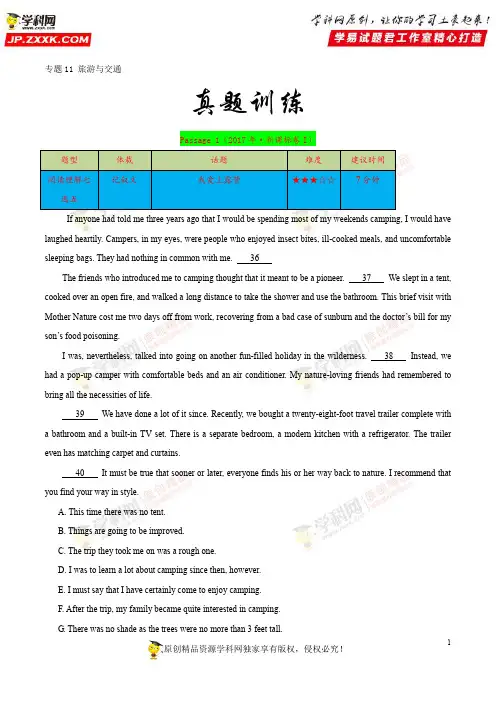
原创精品资源学科网独家享有版权,侵权必究!1 专题11 旅游与交通真题训练Passage 1(2017年·新课标卷I )If anyone had told me three years ago that I would be spending most of my weekends camping, I would have laughed heartily. Campers, in my eyes, were people who enjoyed insect bites, ill-cooked meals, and uncomfortable sleeping bags. They had nothing in common with me. 36The friends who introduced me to camping thought that it meant to be a pioneer. 37 We slept in a tent, cooked over an open fire, and walked a long distance to take the shower and use the bathroom. This brief visit with Mother Nature cost me two days off from work, recovering from a bad case of sunburn and the doctor ’s bill for my son ’s food poisoning.I was, nevertheless, talked into going on another fun-filled holiday in the wilderness. 38 Instead, we had a pop-up camper with comfortable beds and an air conditioner. My nature-loving friends had remembered to bring all the necessities of life.39 We have done a lot of it since. Recently, we bought a twenty-eight-foot travel trailer complete with a bathroom and a built-in TV set. There is a separate bedroom, a modern kitchen with a refrigerator. The trailer even has matching carpet and curtains.40 It must be true that sooner or later, everyone finds his or her way back to nature. I recommend that you find your way in style.A. This time there was no tent.B. Things are going to be improved.C. The trip they took me on was a rough one.D. I was to learn a lot about camping since then, however.E. I must say that I have certainly come to enjoy camping.F. After the trip, my family became quite interested in camping.G . There was no shade as the trees were no more than 3 feet tall.。
关于旅游交通英语中考作文Travel Transportation。
Travel transportation plays a vital role in tourism. It refers to the means of transportation used to reach a tourist destination from the place of origin. It can be by air, sea, rail, or road. The mode of transportation chosen depends on the distance, time, cost, and convenience. 。
Air travel is the fastest means of transportation, and it is suitable for long-distance travel. It is also the most expensive mode of transportation. Sea travel is suitable for long-distance travel, such as cruising. It is also an excellent way to explore different destinations. Rail travel is suitable for medium-distance travel, and it is comfortable and affordable. Road travel is suitable for short-distance travel, and it is flexible and convenient.The transportation industry has undergone significant changes over the years. The introduction of high-speedtrains, low-cost airlines, and online booking systems has made travel more accessible and affordable. The competition among transportation companies has also increased, leading to price wars and better services.However, travel transportation also has its challenges. Traffic congestion, flight delays, and cancellations can cause inconvenience and frustration to travelers. The transportation industry also contributes to environmental pollution, which is a significant concern.To overcome these challenges, transportation companies must improve their services and infrastructure. Governments must also invest in transportation infrastructure and implement policies to reduce environmental pollution.In conclusion, travel transportation is an essential component of tourism. It provides travelers with the means to reach their desired destinations. The transportation industry must continue to evolve and improve to meet the changing needs of travelers.。
话题9 旅游与交通答案版假设你叫李明,你校英语校刊以”A Place I Have Been to ”为题向学生开展征稿。
Have you ever been to ?*Step1 审好题,搭好架①定文体: 说明文 ②定人称:第三人称 ③定时态:现在完成时、一般现在时*Step2 短语荟萃1.have been to 去过…2.have gone to 去了…3.learn about sth.了解有关某事/某物4.such as/for example 例如5.a couple of 几个;两个;一对6.all year round 全年7.go somewhere different 去某个不同的地方 8.places of interest 名胜9.fall in love with 爱上…… 10.thousands of 数以千计的;许许多多的11.have a good/great time = have fun = enjoy oneself 玩得开心;过得愉快*Step3造好句,写准句开篇:介绍曾经去过的地方1.我曾去过昆明( I have been to… )I have been to Kunming.2.你曾去过昆明吗?(Have you ever been to…?Have you ever been to Kunming?3.我和我的父母在暑假期间去了昆明(I went to ... with ... during ...)1.昆明是一个度假的好地方。
( a... place to)Kunming is a wonderful place to take a holiday.2.你可以选择随时去那里。
( ... whenever you like )you can choose to go there whenever you like.3.关于昆明的一件很棒的事情是温度全年都是一样的(One great thing about... is that...)One great thing about Kunming is that the temperature is almost the same all year round.4.一方面,你可以尝试当地各种各样美味的食物(On the one hand)On the one hand , you can try many kinds of delicious local food.5.另一方面,你可以参观有趣的地方( On the other hand)On the other hand, you can visit some interesting places.6.它是一个如此美丽的地方,以至于我爱上了它(It was such a beautiful place that I…) It was such a beautiful place that I fell in love into it.7.我参观了一些有趣的地方,例如滇池(I visited some interesting places such as…)I visited some interesting places like Dianchi.8.当我第一次参观昆明的时候,我就爱上了它(I fell in love with…when I first visited it. )I fell in love with Kunming when I I first visited it.9.在昆明,你可以有一个轻松的假期。
话题10旅游与交通主题语篇阅读Ⅰ.[2020·大兴期末]完形填空DiscoveryIn a vacation, my brother and I decided to go off for a long walk while we were staying in the countryside. On the top of a mountain, a sudden 1began to fall and the temperature dropped a lot. It became so dark that we couldn’t see the path clearly.It was difficult for my brother and me to 2over rocks in the heavy rain. As I paused(停)under a tree, I noticed a cave between two huge rocks. I suggested making a fire and warming ourselves in the cave. So my brother and I picked up some wood that was still 3and carried it back to the cave. I lit the fire with matches in my pocket. We sat down and ate our sandwiches around it.In the cave, the flames 4light onto its ceiling. “Funny,” said my brother. “You can see shapes on the rock. One of them looks a bit like a deer. There is its head and there are its feet. It almost looks as if someone has 5 it.” I took a burning branch(树枝) and went to examine the rock. Now I could see a shape of a smaller deer. Then we went further into the cave. In front of us was a wall of 6. There were birds, too, with the eyes carved(雕刻)out of the rock and painted white. We could see a snake, a bear, a wolf, but no people.At that night, my brother and I were so 7that we did not get to sleep until very late. We talked and wondered about the people who had lived here before. Neither of us realized that these carvings and paintings 8 back 15,000 years, nor that the title in the newspaper would be “The Find of the Century—Children Aged 13 and 11 Discover Cave Paintings”.1.A.rain B.fog C.snow D.sandstorm2.A.look B.turn C.climb D.swim3.A.fresh B.dry C.clean D.alive4.A.put B.hung C.burnt D.threw5.A.raised B.stored C.covered D.drawn6.A.animals B.tools C.guns D.coins7.A.frustrated B.excited C.confused D.relaxed8.A.gave B.got C.dated D.keptⅡ.[2020·顺义期末]阅读理解However exciting space travel sounds, astronauts must still suffer with bad food. Now, food in space has to be dehydrated(使脱水) or pre-cooked and stored. This means astronauts aren’t really eating fresh food.New technology may change this. Scientific American reports that a specially designed oven will be sent into space this autumn with NASA’s NG-12 cargo (货物) mission.Far from the common vacuum-packed(真空包装的) meals, astronauts may get to enjoy freshly baked cookies before the end of 2019.Why aren’t they baking cookies in space already?For one thing, there’s the risk of a fire. Engineers also have to overcome the challenge of microgravity, which prevents heat from circling inside ovens the same way it does on Earth.Astronauts will still have to wait a while before they can have their cookies, though. After baking, the results will be sent back to Earth for safety testing. If successful, this will be the first oven to bake food in space.“I believe…that will be game-changing for both science and astronauts,” food technology researcher Maeena Naman Shafiee told Scientific American.One of the main driving forces behind this project has been NASA’s 2018 research into the effects of“confinement(封闭) and isolation(隔离)”. Unlike on the International Space Station(ISS),astronauts traveling out of Earth’s orbit may not be able to speak to their loved ones on future missions, which could lead to negative feelings.It’s hoped that the chance to bake and sense familiar smells can bring joy to crews(宇航人员).“Is the ISS going to smell like fresh-baked cookies? We don’t know,”said NanoRacks’ communications manager Abby Dickes.“But that’s a feeling we all know and love… that will make someone feel at home.”Baking cookies in space would mark an important step, offering a small comfort in the difficult and unfamiliar environment of space travel. Astronauts have already grown plants aboard the ISS.With commercial(商业的) space travel now being planned, who knows what other developments may surprise us in the future?9.What can the new technology help astronauts to do in space?A.Store more food.B.Enjoy fresh cookies.C.Quickly prepare food.D.Cook many different kinds of home-made meals.10.Why is it difficult to bake cookies in space?A.Because it’s difficult and costly to send food into space.B.Because microgravity stops food from staying in one place.C.Because baking cookies in space would pollute the spaceships.D.Because it is hard to heat food properly because of microgravity.11.What is the main purpose of the cookie project?A.To improve astronauts’ health.B.To make improvements in space travel.C.To encourage more people to travel to space.D.To make space travel more comfortable for astronauts.Ⅲ.回答问题For over 100 years, it is convenient for people to go from one place to another by taxi. But sometimes there are no taxis coming to the place you are waiting. However, this has become a thing of the past since Uber app appeared.What is UberUber is an American company that provides a taxi service through an app on the smartphones. It was set up in March, 2009 and has grown quickly. An app, in fact, is a computer program working on smartphones, computers and other communication devices. By using your smartphone, you can easily and quickly order a taxi that takes you to the place you want to go to.Uber app makes you feel goodThe nicest thing about Uber app is that you can see where your taxi is or how long it will take to reach you on your smartphone screen. And you can also find the telephone number of the driver in Uber app, so you can call or send messages to the driver when you are waiting.Uber taxis are always availableUber is always there 24 hours a day, 365 days a year. If you want to go somewhere, you can easily open Uber app at home or anywhere in the open air, then it connects you to the nearest driver.Usually it takes only between 5 and 15 minutes to get an Uber taxi by using Uber app.The advantages of UberUber is popular because it is simple and very user-friendly. You have nothing to do with a taxi company. If you are not pleased with the ride and the driver, you can give the driver a low score through Uber app, so Uber taxi drivers usually serve well. Generally speaking, Uber is simple, time-saving, and above all, very easy.The cost of an Uber taxiAt Uber, the payment is easy through your bank card. How much you need to pay depends on the country and the city that you are in. It is sure that Uber taxis are much cheaper than the taxis you used to take.12.What is Uber app?______________________________________________________________________________________________13.Can you call or send messages to the driver after ordering an Uber taxi?______________________________________________________________________________________________ 14.How long does it take you to get an Uber taxi by using Uber app?______________________________________________________________________________________________ 15.Why do Uber taxi drivers usually serve well?______________________________________________________________________________________________ 16.What is the writer’s main purpose of writing this passage?______________________________________________________________________________________________【参考答案】主题语篇阅读Ⅰ.[主旨大意] 本文是一篇记叙文。
中考备考阅读话题练习:旅游和交通一、阅读理解(共20小题;共40分)AThere is a sign at a Korean university asking tourists not to step into the grass to take photos. The sign is not written in Korean or English; it is written in Chinese.These signs, and signs in other countries warning Chinese tourists about their behavior, have shamed many Chinese who worry about the image of the country.Over 70 million Chinese tourists made overseas trips last year and spent $102 billion, more than the $84 billion spent by American and German tourists. For many Chinese tourists, it was their first trip abroad and they didn't know about foreign ways. And some of these tourists took their bad habits from China with them.Wang Yang, a Chinese deputy prime minister (国务院副总理), said, "They (the tourists) speak loudly in public, carve words or numbers on tourist attractions, cross the road when the traffic lights are still red and spit anywhere. It damages(毁坏) the image of the Chinese people and has a very bad influence."Before you travel to a foreign country, it's important to learn some things about the country and its culture. You are guests in the country and it's important to respect(尊重) your hosts. As more and more Chinese visit foreign countries, their behavior will certainly change and those shameful signs will, hopefully, disappear.1. The sign at a Korean university is written in .A. ChineseB. EnglishC. Korean2. How do many Chinese feel about the signs?A. Proud.B. Interested.C. Shameful.3. The underlined word "image" probably means " " in Chinese.A. 形象B. 热情C. 财富4. The passage is written to .A. order the Korean university to clean up signs with Chinese wordsB. advise the overseas Chinese tourists to change their behaviorC. ask Chinese people not to spend too much money traveling abroad5. What would be the best title for the passage?A. Signs Shame Overseas Chinese TouristsB. Foreign Culture Makes Bad InfluenceC. Foreign Countries Attract Chinese TouristsBThere are several ways you can find out about the countries and places you wish to visit. You can talk to friends who have traveled to the places, you can go and see a colour film about them, or you can read a travel book.It seems that there are three kinds of travel books. The first are those that give a personal, subjective(主观的) idea of travels which their writer has got himself. These books can be useful if the writers share their traveling experiences with others. The second kind are those books which give objective(客观的) information of things to be done and seen. If a cultured person has written such a book about the facts of a place, then it is more useful. The third kind are those books which are called "a guide" to some place or other. If they are good, they will describe and explain the place in detail. Like the first kind , they can be interesting and exciting, but their main purpose is to help the reader plan his travel in the most practical way.Whatever kind of travel book you choose, you must make sure that the book does not describe everything as interesting, exciting or fantastic. You must also keep an open eyes on its date of publication(出版) because travel is very practical matter and many things change quickly in the 21st century. Finally, you should make sure that it's easy to find the useful information for you travel.6. The passage was written to introduce .A. travel mapsB. travel booksC. travel filmsD. travel places7. The writer of the first kind of travel books gave his ideas after he .A. traveledB. read booksC. a lot of experienceD. surfed the Internet8. The underlined phrase "a cultured person" means a person with .A. a good appearanceB. a good educationC. a lot of experienceD. a lot of money9. The date of publication must be noticed because .A. the prices of travel books may be differentB. the writers of travel books may be differentC. the information in travel books is always the sameD. the information in travel books is always changing10. According to the passage, it is best to read before traveling to a place of interest.A. the first kind of travel booksB. the second kind of travel booksC. the third kind of travel booksD. some travel articles in newspaperCA city in California has got some new buses. They cost $490,000 each. The new buses are different from the old ones. These new buses are better for the environment. They are called hybrid(混合动力的) buses. They run on diesel(柴油的) and electric power. This will help keep the air cleaner. The man drove the new bus on Wednesday and noticed a difference right away. "I get to have clean air for a change", said driver Melvin Day, "I'm smelling diesel all day long when I drive the old ones."The company that builds the buses had many good things to say about them. For example, they said they use a lot less fuel(燃料). They also said that they are 90% cleaner for the environment. The buses are very quiet, too.The buses have a diesel engine in the back and batteries(电池) on top. When the engine starts up, it is powered by electricity. Then the diesel power takes over.One other bit of good news: The price of the bus ticket will not rise because of the new buses.11. Why are the new buses better for the environment?A. Because they're cheaper than the old ones.B. Because they are very quiet.C. Because they run on diesel and electric power.D. Because they are new.12. Which one is NOT TRUE about the new buses?A. They use a lot less fuel.B. They can drive faster than the old ones.C. They will help keep the air cleaner.D. The buses are very quiet.13. How many buses does the city have now?A. 490.B. 90.C. 45.D. 50.14. Which one is TRUE about this article?A. The driver liked the new buses very much.B. The new buses don't use fuel at all.C. The city will replace the old buses in a year.D. The price of bus ticket will be high.15. What is the best title for the article?A. The New CarsB. Electric BusesC. The Advantages of Old BusesD. Buying New BusesDMany Americans have been leaving their cars at home and riding to work on bicycles. Andy Clark is the leader of the League of American Bicyclists. His group supports bicycling for fun, fitness and transportation.Clark says this is good news for the environment. He says riding a bicycle to work does not burn fossil fuel or creates dangerous pollution. Experts say the effects are the most important on short trips. Shorter car trips give out more pollution into the air for each kilometer drive. This is because the car engine will give out the harmful gas when it warms up before it can work well.James, a member of Congress, is a strong supporter of bicycle use. He says cities, counties, state governments and state highway transportation agencies are planning the roadways of the future. They are creating roads and paths for bicycles in cities between communities.Portland, the Pacific Northwest city in the state of Oregon, had the highest percentage of bicycle users in United States. Portland has been doing progressive city planning for many years to create special paths for bike riders.16. What is happening in America according to the news?A. Many Americans have lost jobsB. Many Americans prefer short tripsC. There are more and more bicyclists nowD. The pollution is getting worse and worse17. What is the closest meaning t o the underlined word “harmful” in the second paragraph?A. CleanB. BadC. WarmD. Dry18. What is the main idea of the passage?A. Many Americans like bike-riding for funB. Short car trips can reduce pollutionC. American government doesn't allow people to ride bicyclesD. Many Americans ride bicycles to support environment protection19. Which of the following is NOT true according to the passage?A. Clark's group thinks bicycling is good for healthB. James strongly supports bicycle useC. Portland is one of the states in the USAD. Portland is planning to create special paths for bike riders20. Where can we read it possibly?A. From a websiteB. From a posterC. From a novelD. From an advertisement二、阅读与表达(混合式)(共5小题;共5分)A kind of small car may someday take the place of big ones. They will be popular. The car is as small as a bike. It can carry two people in it.If everyone drives such a car in the future, there will be less pollution in the air. There will also be more space for cars and people in cities. Three such cars can fit in the space now needed for one car of the usual size.These small cars will cost much less to drive. They can only go 65 kilometers an hour, so driving will be safer, too. You can drive these cars to go around the city, but you'd better not use them for a long trip.This kind of car can save a lot of gasoline(汽油). They can go 450 kilometers if they are filled up (加满油).21. 判断正(T)误(F)The more small cars people drive, the more pollution there will be in the air.22. This kind of car can be as small as .23. How fast does this car go per hour?24. Can the small cars save much gasoline?25. 将画线句子译成汉语。
分类默写(十) 旅游与交通1.旅游交通(n.)旅行(n.)旅行;旅程(n.)旅行;路途(n.)参观;观光;旅行(n.&v.)参观;拜访(n.)访问者;参观者(n.)情景;风景(n.)观光(n.)场景;景色(v.)放松(adj.)放松的(n.)人群(v.)使……拥挤;挤满(adj.)拥挤的(n.)票(adv.)到国外(n.)指导;导游(n.)机场(n.)车站;电台公共汽车站(n.)卡车(n.)事故;意外的事(adj.)安全的(v.)穿过(n.&v.)航行(v.)驾驶;驱赶(n.)护照(v.)骑(马、自行车等);乘车(v.)飞行;(旗子等)飘动;空运(vt.)用船装运(n.)轮船(v.)登岸;降落(n.)飞机(n.)公共汽车(n.)自行车(n.)火车(n.)小汽车(n.)小船(n.)出租车(n.)地铁(n.)交通(n.&v.)运输;运送(n.)飞行;航班(n.)马车;长途车;教练(n.)轮子(n.)路线;路(n.)铁路2.方位(n.)方向(n.)中心(n.)边;面;侧(n.)前面;前线(n.&adj.)中间(的)(n.)底部(n.)顶部(n.)表面(n.&adj.)东方;东方的(n.&adj.)西方;西方的(n.&adj.)南方;南方的(n.&adj.)北方;北方的(prep.)在(几点钟);在(某处)(prep.)在……之上;在……上面(prep.)多于;在……上方;遍及(prep.)在……下面(prep.)在……下面(prep.)在……之中(prep.)在……之间(prep.)里面;在(或向)里面(prep.)环绕;四周(prep.)在……旁边(prep.)在……后面(adv.)向上,起来(adv.)向下(adv.)向后(adj.)东部的(adj.)西部的(adj.)南方的(adj.)北方的;北部的(adj.)中心的(adj.&v.)近的;亲近的;关闭(adj.)近的;接近(adj.)隔壁的;紧接着的;下一步(adj.)远的(adj.)直的;笔直的(adj.)低的(adj.)左边的(n.)左边(adj.)正确的;右边的(n.)右边赠送:鲁版中考专题(十四) 复合句语法综合演练|宾语从句|1.—Can you describe ?—Yes. I was walking when a bike knocked me down from behind.A.why did the accident happenB.when did the accident happenC.how the accident happenedD.where did the accident happen2.[2019·眉山]—What did Tom say to you just now, John?—He wondered .A.what I am so happy todayB.what will I do for the weekendC.who did I play football with after schoolD.if I could go to the movies with him tonight3.[2019·宿迁]—What did Mr Wang ask you just now?—He asked me yesterday afternoon.A.why I am absent from schoolB.why I was absent from schoolC.why am I absent from schoolD.why was I absent from school4.[2019·青岛]—Could you tell tomorrow?—It will be sunny.A.what will the weather be likeB.what the weather will be likeC.when will the weather be sunnyD.when the weather will be sunny5.[2019·重庆A]—Dear friends, do you still remember three years ago? —To realize our dream!A.why you came hereB.why did you come hereC.how you came hereD.how did you come here6.The documentary about SIP is really great. It shows .A.if is SIP a wonderful place to live or notB.when was the high-speed railway in useC.what has the government built in open spacesD.how people’s living conditions have been improved7.[2019·北京]—Did you notice in her office?—Yes. She was going over our writing.A.what was Miss Lin doingB.what Miss Lin was doingC.what does Miss Lin doD.what Miss Lin does8.[2019·河池]My cousin hasn’t decided this weekend.A.how will he go to ShanghaiB.how he will go to ShanghaiC.how has he gone to ShanghaiD.how he has gone to Shanghai9.My American friend Sam is interested in Yangzhou very much. He wonders .A.how Ge Garden got its nameB.which place can he choose to visit firstC.when was the Slender West Lake builtD.that Yangzhou has a 2,500-year-old history10.[2019·无锡]You’ve no idea to build a new airport. Let me tell you, young man. That’s billions of dollars!A.how much it will cost usB.how long it will take usC.how much will it cost usD.how long will it take us|状语从句|1.[2019·武威、白银]it rained a lot, we enjoyed our holiday.A.AlthoughB.BecauseC.UnlessD.However2.Adults are not allowed to enter the Legoland Discovery Center they go with a child.A.wheneverB.untilC.unlessD.though3.[2019·广元]They didn’t go ho me they finished their work.A.becauseB.whenC.untilD.if4.[2019·黄冈]—What do you think of the new movie The Wandering Earth(《流浪地球》)?—It’s wonderful I really like it.A.so; thatB.such; thatC.too; toD.enough; to5.[2019·内江]Cathy is afraid of the dog. She will run away she sees it.A.ever sinceB.althoughC.as soon asD.so that6.[2019·无锡]I do, I do it for you. Do not ever doubt that, my boy.A.WhateverB.WhereverC.WheneverD.Whoever7.[2019·贵州]You’d better take the map with you you won’t get lost.A.so thatB.as soon asC.now thatD.as long as8.—The air pollution is still terrible in some areas.—It will be even worse we take action to protect the environment.A.ifB.untilC.unlessD.when|定语从句||易错题专练|1.[2019·达州]—Frank, look! Who are the children under the tree waiting in line? —They are the students from No.1 Primary School.A.that areB.where areC.which isD.who is2.I’ll never forget the days we spent together on the beach last summer.A.whichB.whenC.whoD.how3.—Have you found the information about the famous people you can use for the report? —Not yet. I’ll search some on the Internet.A.whoB.whatC.whomD.which4.[2019·铜仁]—What are you doing?—We are talking about the books and writers we like.A.thatB.whichC.whoD.whom|冲刺中考|1.—Have you seen the film Mulan?—Yes. It’s the best one I have ever seen.A.thatB.whichC.whatD.it2.[2019·临沂改编]Peppa Pig is a British cartoon has been popular in China and is much loved by little children and their parents.A.whoB.whichC./D.whose3.[2019· 广东]Not all children watch this video will become a scientist, but some may become interested in science.A.whomB.whichC.whoD.whose4.[2019·黄冈]—Tomorrow is Father’s Day. What’s your surprise for your father?—The first thing I will do is to make a card for him.A.whoB.whereC.whoseD.that5.—What are you doing, Elvis?—I am listening to the song Dream Is Possible sung by Jane Zhang voice always makes me feel energetic.A.whatB.whoC.whoseD.which6.I like the city the people are really kind and friendly.A.thatB.whichC.whereD.who7.—Please tell me something about Yang Liwei.—He is a great astronaut of all the Chinese are proud.A.thatB.whoseC.whoD.whom8.Yesterday Mr Green went to his hometown and visited the old house he was born in.A.whichB.whereC.whatD.it|三大从句综合考查|Ⅰ.单项选择1.Your speech was heard by a group of judges, all of agreed it was the best one this year.A.who; whetherB.whose; whereC.whom; thatD.which; when2.—I am worried about I can get great grades in the final exams.—you’ll get, don’t be too hard on yourself.A.that; WheneverB.what; HoweverC.if; WhateverD.whether; Wherever3.—Could you tell me the International Tourism Festival has been open?—It is more than a month it was open to the visitors.A.how much; whenB.how long; sinceC.how many times; beforeD.how far; after4.He made a hole in the wall, he could see .A.on which; what did happenB.in which; what happening was in the houseC.through which; what was happening in the houseD.at which; what happens5.—Could you tell me when he back?—Sure. He will come back as soon as he the classroom.A.came; finishes cleaninges; will finish cleaningC.would come; will finish cleaningD.will come; finishes cleaningⅡ.根据首字母提示填空。
Topic Ten Travel and Transport 旅游与交通话说中考该话题是中考中较为关注的命题之一,其题型不拘泥于记叙、议论等体裁,体现当代英语特点:紧跟时代步伐,体现时代信息;题目简洁明晰;选项表意清楚,逻辑合理。
这就要求做题时,注意文中提供的有用信息,整体把握文中内容。
解题思路:熟悉题型,筛选有用信息,进行推理与归纳。
走进中考(山东潍坊·2010)Expo 2010 is held in Shanghai from May 1 to October 31.People all over the world are looking forward to it.Here are several golden rules on how to best plan your trip.Rule 1:Do your homeworkRead everything you can before going.Really study the maps.Know the pavilions.Arrive at the entrance nearest to the things you want to see.Have a plan.It will make a big difference.Rule 2:Allow plenty of timeExpo 2010 is the largest attraction event in the history of the world.It will take many days to see it.Plan to spend from five to eight days or more seeing it.Rule 3:Pace yourselfExpo is enormous.The distances are punishing.It is better to spend a day seeing a single area than to run back and forth all over the site.Remember to wear the most comfortable shoes.Never mind what they look like.Rule 4:Get going in MayAt many Expos the crowds are smaller in May and in early June than any other time.And beware the last two weeks.During every Expo,people delay their visits and then in early October they suddenly realize,"Expo will close soon! I haven't seen it!" As a result,the last several weeks usually have the most crowded days of the entire Expo.Rule 5:Find out what everyone else is doing and do the oppositeIf you don't like large crowds and long lines,do the opposite.Here is an example:Most people go on Saturdays or on holidays.So avoid Saturdays and holidays.Go on weekdays when most people are at work.Rule 6:Turn upExpo 2010 is the largest celebration in China's history —an amazing once in a lifetime event.When it is gone and it will never be seen again.So whatever you do,don't miss it!根据短文内容,选择正确答案。
( ) 1.Expo 2010 will last _______.A.five to eight daysB.several weeksC.six monthsD.a year( ) 2.According to Rule 4,you'd better not go to Expo on _______.A.May 3B.July 5C.September 16D.October 20( ) 3.When there are lots of people waiting in line to see the most popular attractions,what's your best choice?A.I'll wait in line as other people do.B.I'll go back and return tomorrow.C.I'll visit the less crowded places instead.D.I'll sit on a bench to have a rest for about two or three hours.( ) 4.In Rule 6 "turn up" here means _______.A.don't miss itB.come and seeC.make the sound louderD.never be seen again解析1.C 根据“Expo 2010 is held in Shanghai from May 1 to October 31.”可知世博会历时6 个月,故正确答案为C。
2.D 根据Rule 4 的内容可知如果在十月的最后几周去世博会是比较拥挤的,故正确答案为D。
3.C 根据Rule 5 的内容可以推测出C 项是最好的选择。
4.B 根据Rule 6 的内容我们可以推断出,turn up 在此意为“到场”,故B 项比较正确。
话题专练一Welcome to our 9-day traveling program.We'll provide you with a wonderful traveling experience in China.Day 1 —_Arrive in BeijingArrive in Beijing,meet your tour guide and check in at the hotel.Day 2 —BeijingBegin the day with a visit to Tian'anmen Square —one of the world's largest city squares.Then move on to the Palace Museum,a symbol of traditional China.Day 3 —BeijingVisit the Summer Palace,one of China's largest and best-kept imperial gardens.Day 4 —BeijingVisit the Great Wall,a symbol of Chinese culture.Day 5 —Beijing —Xi'anAfter breakfast,take a walk through some old "hutongs",a kind of ancient city street.Fly toXi'an and check in at the hotel.Climb the old City Walls in the afternoon.Day 6 —Xi'anVisit the 2200-year-old Terracotta Warriors of China's first emperor,Qin Shihuang.Day 7 —Xi'an —ShanghaiFly to Shanghai.Visit the beautiful "Waitan".There are many beautiful old buildings in the style of early 20th century Europe.Day 8 —ShanghaiVisit Shanghai Museum in the morning,a leading city attraction since its opening in 1994.Do some shopping in the afternoon along the Bund,the famous business area of Shanghai.Enjoy a farewell dinner at the hotel.Day 9 —Return homeGo to the airport and take the plane to return home.根据短文内容,选择最佳答案。
( ) 1.If your family take part in the program,what are you going to do on the first day?A.Arrive in Beijing.B.Meet our tour guide.C.Check in at the hotel.D.All of the above.( ) 2.How many days will you stay in Beijing?A.Three.B.Four.C.Four and a halfD.Six.( ) 3.Where will you visit in Xi'an?A.The Bund.B.The Terracotta Warriors of the first emperor,Qin Shihuang.C.The Great Wall.D.The Palace Museum.( ) 4.Where will you leave for on the seventh day?A.Shanghai.B.Beijing.C.Xi'an.D.Home.( ) 5.Where will you enjoy a farewell dinner?A.Beijing.B.Xi'an.C.Shanghai.D.I don't know.答案:1.D 根据文中对第一天行程的安排可知,应是到北京、见导游并且登记住处,所以选D。